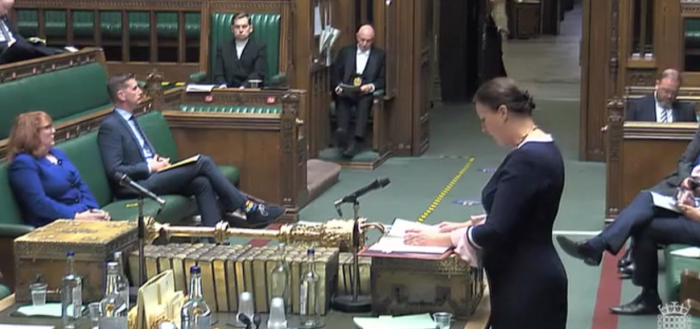The Government has rejected amendments to the Agriculture Bill that would have protected farmers from imports produced to standards not permitted by law in the UK, under future trade deals.
Last night, MPs voted on a number of amendments added to the Bill in the House of Lords, including Amendment 16, which would have required free trade deals to only allow food imports that meet UK legal standards.
But while the amendment from Labour peer Lord Grantchester was rejected by 332 votes to 279, a number of Conservative rebels voted for it, including EFRA chair Neil Parish and former Defra Secretary Theresa Villiers (see below for full list).
Crossbench peer Lord Curry’s Amendment 18, which would have given the Trade and Agriculture Commission significantly more powers to scrutinise future trade agreements before they are finalised, was not selected for a vote by the Speaker.
You can view the debate (from 6pm) HERE and the Hansard transcript HERE
While much the debate covered the high-profile issues of chlorine-washed chicken and hormone-injected beef, a number of MPs in favour of the amendments highlighted the significant differences in standards of production between UK and US pork, notably the continued use of sow stalls in the US.
Labour MP and former Defra Secretary Hilary Benn said: “I want to talk about sow stalls, which were banned here in 1999. No doubt the Minister will be aware of the new cruel confinement law, as it is called in California, which not only bans the use of sow stalls in that state, but bans the sale in California of pork produced in other American states that still use sow stalls.
“I am advised that that includes Iowa and Minnesota. Could the Government please explain why it appears that California is able to ban food products produced by what we regard as cruel means in other states of the United States of America, but that we somehow have difficulty in doing the same in deciding our new rules?”
Labour MP Ruth Cadbury added: “If we do a trade deal with the US that has no conditions on animal welfare, our farmers will be at risk, because they will have to compete with low-cost agricultural mega-corporations, such as those US pork farmers still using sow stalls.
“To prevent the cruelty of practices such as sow stalls, we need a law which says that, in all trade deals, any imports must meet the same standards of animal welfare that British farmers are required to meet.”
To view a Pig World article outlining what the US pig sector wants from a UK trade deal and the vast differences in production standards, CLICK HERE
Shadow Farming Minister Luke Pollard said a failure by the Government to back ‘legal guarantees that our high UK food and farming standards will not be undercut in post-Brexit trade deals, whether with the USA, Australia or any other country’ will result in ‘lower-quality food on our plates’.
He highlighted the huge level of support among farmers, environmental and animal groups and consumers for legal protection on import standards. “Our farmers risk being undercut by cheap imports from abroad within months. If the Government are serious about keeping their manifesto promise to safeguard standards, they should put that guarantee into law,” he said.
He claimed that the Government’s refusal to put that its manifesto pledge about maintaining food standards under trade deals into law ‘raises the question as to whether that part of the manifesto was truly meant and whether that promise can be believed’.
But Farming Minister Victoria Prentis described the claims made by MPs from all parties that the Agriculture Bill, alongside the new Trade Bill, could pave the way for imports produced to lower standards than permitted by law in the UK as ‘fear-mongering’.
“We are not going to be importing chlorine-washed chicken or hormone-treated beef. That is the law of this land,” she said.
“There is no question of ‘Not yet’. This Government are not going to change it under any circumstances. We have said very clearly that in all our trade negotiations we will not compromise our high environmental protection, animal welfare or food standards.”
She claimed ‘existing tools’, including regulation and parliamentary scrutiny of trade deals, were sufficient.
But Mr Parish said additional scrutiny was required before trade deals were done. “Yes, we will get a certain amount of scrutiny of the trade deals when they are done, but the deal will be signed and then presented before Parliament. There will then be the option of objecting to it, or voting it through,” he said.
“That is why the work has to be done. We do not need the whole Trade and Agriculture Commission; we could have a slimmed down version that could consider every individual deal over the years, as we sign it, to ensure that we do not trade away those standards, and that we improve standards across the world—that we raise the standards of animal welfare and the environment. Surely that is laudable.”
The Bill now heads back to Lords.
Conservative rebels
Last night, 14 Conservative MPs defied the whip to vote in support of NC16 (Lord Grantchester/Neil Parish amendment):
Aldous, Peter
Crouch, Tracey
Freeman, George
Gale, rh Sir Roger
Hoare, Simon
Hudson, Dr Neil
McCartney, Jason
McPartland, Stephen
Nokes, Caroline
Parish, Neil
Ross, Douglas
Smith, Henry
Sturdy, Julian
Villiers, Theresa




